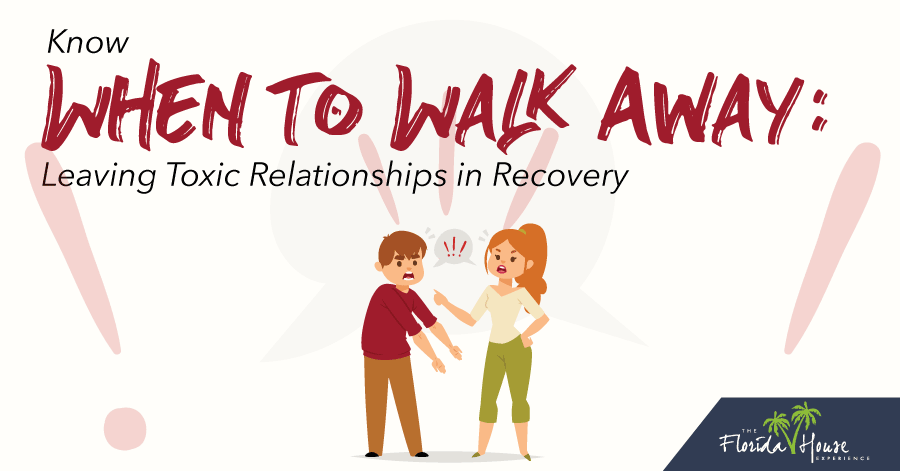
In drug and alcohol addiction recovery, every person has to take a long, hard look at each of the relationships they have and decide how to improve them or let them go. When you’ve identified the people close to you who are likeliest to hold you back, though, how do you make the decision of walking away from a relationship?
During counseling and both group and individual therapy sessions at FHE Health, you’ll gain more insight into making the best decisions for your individual needs — something nobody else can do for you. At this moment in your life, you need to think about yourself and your future. Though hard, this may mean walking away from a relationship and removing some toxic relationships from your life.
Treatment can begin quickly and discreetly, get started now To remain in a relationship, it must be possible for you to reconstruct it around your new life in recovery. From friendships and family to your spouse, this means considering how the relationship will change, such as: Life changes significantly after recovery. The National Institute on Drug Abuse reports that up to 60 percent of people who enter recovery will face relapse. You need to ensure the relationships you create are not leading to that point. Ready to start? More questions about treatment? In recovery, you will spend some time evaluating every aspect of life around you, including each of your relationships. During this evaluation process, you may learn that some relationships are really holding you back from living the life you decide. Take a look at a few steps that can help offer some clarity to this process and whether to walk away from a toxic relationship.. Take a look back over the period of your drug and alcohol abuse at which relationships stand out the most. Consider whether those ties influenced, supported or even encouraged you to enter your path towards substance abuse. If so, the presence of these individuals in your life right now, especially if they continue to use, is highly dangerous and you may have to consider walking away from these relationships. Don’t be upset if they can’t. Remember, they have a life to live as well. Only when you become healthy can you begin to work through past injuries and relearn how to trust. This is perhaps the most difficult realization to come to when you are in recovery. Just because someone is a relative doesn’t mean that person needs to be in your life. Drinking can stem from past abuses by an older relative. Perhaps there is someone who is hurtful and angry towards you. You may even be unable to rebuild a relationship with a sister or a brother who continues to choose to use drugs or alcohol. Though very difficult, it’s important to realize that sometimes family can also be toxic, and you may have to consider walking away from that relationship. If you simply cannot write off someone close to you, ask that person to remain out of your life until you’ve rebuilt your emotional health. Find an approach to this that fits your needs. Your counselor will work with you to develop a step-by-step process for handling difficult relationships. Some options may include writing a letter or documenting your decision in your journal. You don’t always have to confront the individual to walk away from the relationship. Rather, you simply need to make peace with yourself. Inform the individual that you cannot be a part of their life right now, and mean it. You are likely to encounter numerous situations like this throughout your lifetime. Keep yourself and your future as your primary goal. We offer 100% confidential and individualized treatment When you are faced with these types of harrowing decisions, realize you’re not alone. In many ways, you can still work closely with your counselor, even after your treatment ends, to handle difficult situations as they arise. Most people have to battle relationships on an ongoing basis. Take the first step in improving your life by enrolling in drug and alcohol treatment at FHE Health. Work with a team that’s dedicated to helping you make the best decisions for your future. Treatment can begin quickly and discretely, get started now Chris Foy is a content manager and webmaster for FHE Health with years of experience in the addiction treatment industry...read moreNeed Help?
First Step: Define the Future You Want
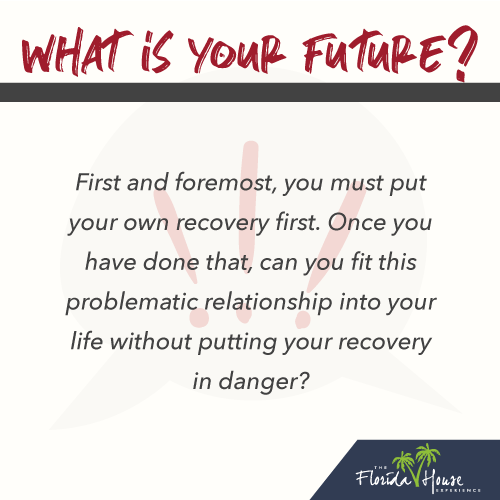 It’s easy to see how some “friends” no longer fit into your daily life in recovery. However, most relationships are more complex. Before you can decide who to break ties with and what relationships to walk away from, focus on what you need and want most out of your life right now. In recovery, you must surround yourself with supportive people who can further your success. Healthy relationships are the backbone of your ability to remain relapse-free. Consider what this means for you personally.
It’s easy to see how some “friends” no longer fit into your daily life in recovery. However, most relationships are more complex. Before you can decide who to break ties with and what relationships to walk away from, focus on what you need and want most out of your life right now. In recovery, you must surround yourself with supportive people who can further your success. Healthy relationships are the backbone of your ability to remain relapse-free. Consider what this means for you personally.
Begin your recovery today
How Do You Decide Which Relationships to Fix and Which to Walk Away From?
1. Evaluate the Relationships You Have Now
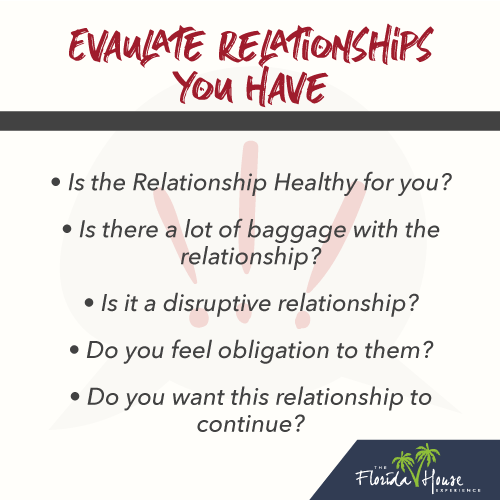 As you are in treatment and perhaps your first months out of it, consider which relationships you have right now. Who is speaking to you, contacting you or supporting you? These are the first relationships to work on, since they play a role in the most delicate phase of your treatment. Ask these questions:
As you are in treatment and perhaps your first months out of it, consider which relationships you have right now. Who is speaking to you, contacting you or supporting you? These are the first relationships to work on, since they play a role in the most delicate phase of your treatment. Ask these questions:
2. Look at Past or Distant Relationships
3. Consider the Road Forward
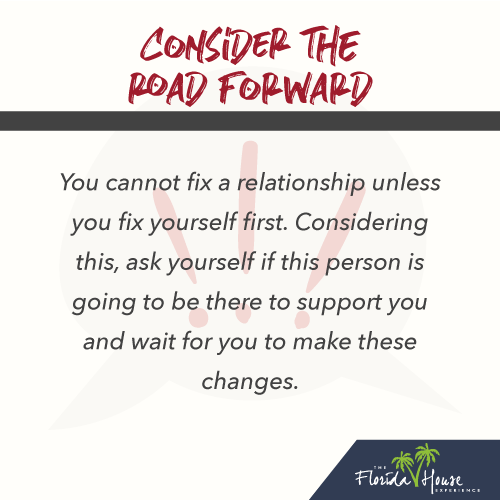 Here’s an important statement to consider about relationships in recovery. The healing and improvement you need to do right now has to be more important and possible before any relationship healing can occur. You cannot fix a relationship unless you fix yourself first. Considering this, ask yourself if this person is going to be there to support you and wait for you to make these changes.
Here’s an important statement to consider about relationships in recovery. The healing and improvement you need to do right now has to be more important and possible before any relationship healing can occur. You cannot fix a relationship unless you fix yourself first. Considering this, ask yourself if this person is going to be there to support you and wait for you to make these changes.4. Family Isn’t a Requirement
5. Be Okay with Saying Goodbye
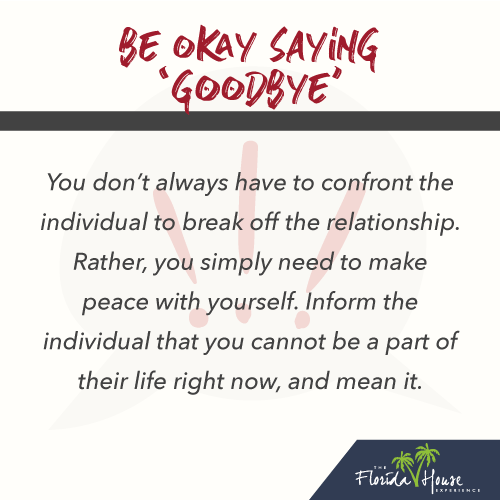 Not all relationships can survive recovery. It’s important to find a way to break free and walk away from a relationship when necessary. Disengagement, especially from a spouse, significant other, parent or sibling, is very difficult. Yet, it tends to be the best decision for all involved.
Not all relationships can survive recovery. It’s important to find a way to break free and walk away from a relationship when necessary. Disengagement, especially from a spouse, significant other, parent or sibling, is very difficult. Yet, it tends to be the best decision for all involved.More Questions about Treatment?
Finding the Help You Need at FHE Health
Start Treatment Now
![]()
About Chris Foy
Footer






